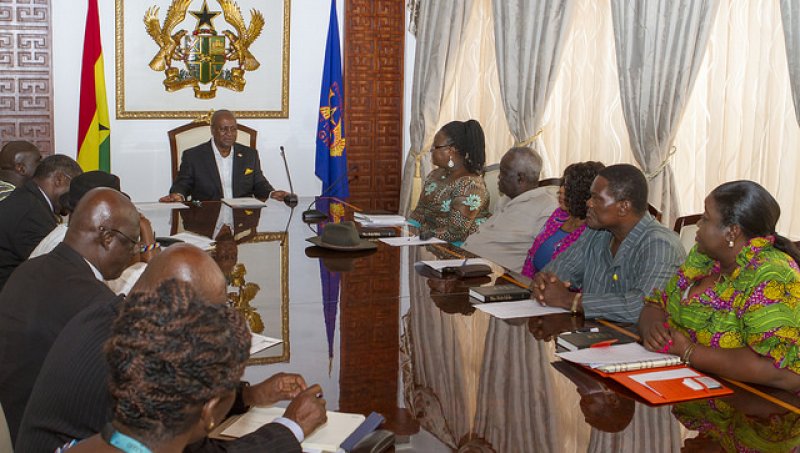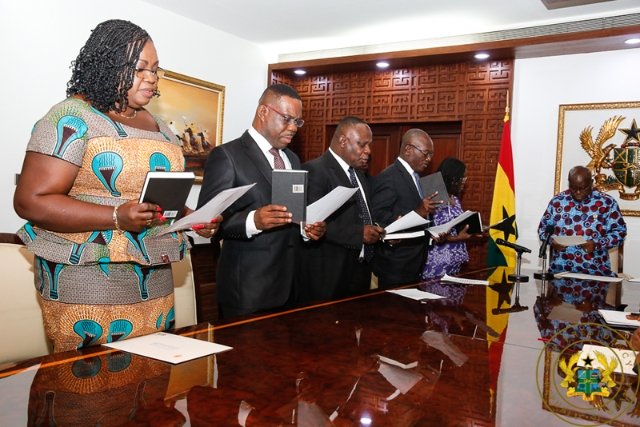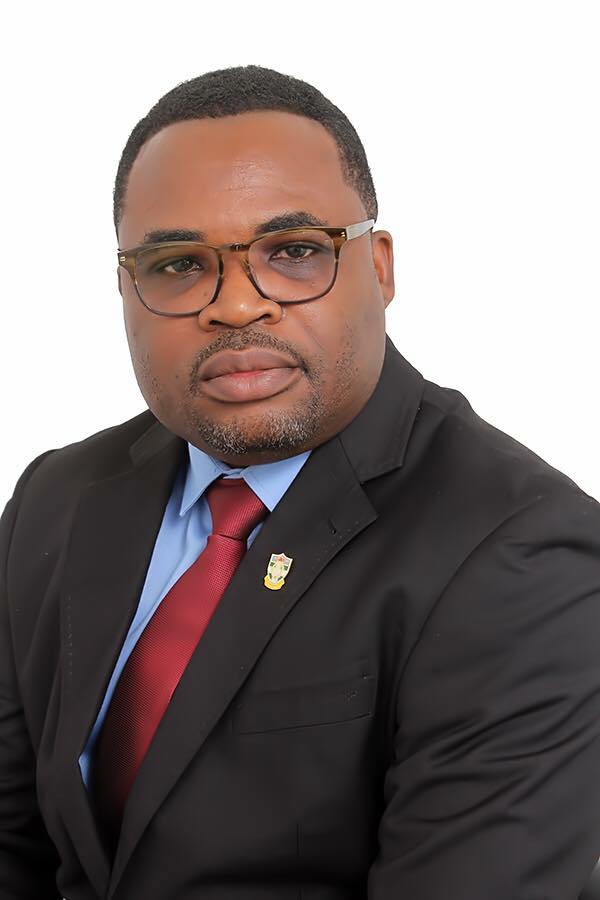Two days ago, the President, Nana Addo Dankwa Akufo-Addo inaugurated a five-member Presidential Committee on the salaries, emoluments and allowances payable and the facilities and privileges (including retiring benefits and awards) to be made available to Article 71 office holders.According to the President, the Terms of Reference covering the Committee’s work are to make recommendations in respect of emoluments and other privileges for Article 71 office holders, as specified under the Constitution; and to examine any other relevant matter which the Committee deems appropriate to its work.
As per the dictates of our Constitution, the Article 71 office holders include the President of the Republic, Vice-President, Speaker of Parliament, Deputy Speakers of Parliament, Chief Justice and all Justices of the Superior Court of Judicature (Supreme, Appeal and High Courts). Others are the Auditor-General, Chairperson, Deputy Chairpersons of the Electoral Commission, Members of the Electoral Commission, Commissioner for Human Rights and Administrative Justice, Deputy Commissioners of the Commission for Human Rights and Administrative Justice as well as the Commissioners, the Administrator of the District Assemblies Common Fund; the Chairman, Vice Chairman and members of the National Council for Tertiary Education, the Public Services Commission, the National Media Commission, the Lands Commission, the National Commission For Civic Education and all such other Commissions whose expenditure is charged to the Consolidated Fund. It also includes Members of Parliament, Ministers of State (Cabinet, Sector, Deputies, etc), all political appointees and public servants with salaries charged to the Consolidated Fund but who enjoy special constitutional privileges.
Article 71 clauses 1 and 2 of the 1992 Constitution requires that the determination of the salaries, allowances and other emoluments of members of the Executive, Legislature and Judiciary chargeable to the Consolidated Fund be done by the President upon the recommendations of a Committee of not more than five persons appointed by the President, acting upon the advice of the Council of State.
The exercise of the new Presidential Committee of Prof. Yaa Ntiamoah-Badu, is in all fairness one that follows a long line of previous ones chaired by Prof. Marian Ewurama-Addy, Prof. Mirianda Greenstreet, Mr. Ishmael Yamson, Mrs. Mary Chinery-Hesse and Prof. Dora Francisca Edu-Buandoh established under various administrations of this 4thRepublic.
For the uninitiated, this is how the Presidential Committee on Emoluments operate. For reasons unknown, they are usually inaugurated in the third year of any presidential term. After its inauguration, they go into almost a year of quiet operational phase only to slip a most confidential report on their recommendations to His Excellency the President mostly at the dying embers of a presidential term. The President undertakes some consultations after which he determines the salaries, emoluments and allowances payable as well as the facilities and privileges for the Right Honourable Speaker, his two Deputies and Members of the Parliament.
When the report is submitted to the House for approval, they then go into a conclave (Committee of the Whole) where they also consider and approve the salaries, emoluments and allowances payable as well as the facilities and privileges for the President, his Vice, Ministers of State and all the others that make up the Article 71 appointees. At this point, my dear friend, it is clear that the entire process then becomes one of ‘Scratch my back, I scratch your back’.
For a President who would have completed his tenure and unsure of what retirement await awaits him; for a President who’d have stretched himself of all available funds to fight a re-election battle (mostly very resource sapping); for Members of Parliament who’d have lost their lost their seats or spent every Pesewa to win their re-election bids, there couldn’t be any better opportunity at recovering from the financial nightmare than this opportunity.
Though the Presidential Committee on Emoluments has always had different compositions and constituted of very eminent citizens with advisory services from other distinguished professionals from the labour industry, the recommendations of each of these committees have been outrageous, to say the least. Release of the reports has always been met with anger and resentment from a reasonably large segment of the Ghanaian populace. A few enlightened segments have for instance questioned the basis for Members of Parliament to receive Ex-Gratia at the end of their four-year service to the State only to be returned to service and paid again after another four years.
By this preposterous arrangement, some Members of Parliament, for instance, have received these allowances seven times already. Yet, this seething antipathy by the ordinary Ghanaian year in, year out has done nothing to change the face in the determination of emoluments for Article 71 Officeholders. My dear friend, have you ever heard of any employment in Ghana where a person retires every four years and is paid a retirement benefit only to be re-employed almost immediately to work for another four years and earn a similar retirement benefit? This is so very absurd but we live in Ghana where absurdities can be entertained in the name of constitutionalism.

When President John Evans Atta-Mills assumed office in 2009, he shared the outrage of Ghanaian people and established a review committee in February 2009. He was soon to be dissuaded by elements within from any serious action on that and the status-quo prevailed and continued.
That provision in Article 71 of our Constitution which allows the President of the Republic to determine the salaries, allowances and privileges of Parliamentarians and in a vice-versa arrangement has the House of Parliament determine the salaries, allowances and privileges of the President makes an absolute mockery of every sense of reasonableness.
For a nation that is struggling financially and unable to independently balance its budget, to engage in this outrageously expensive exercise every four years is to virtually adduce that we either do not have any priorities right or seeking to imply that the category of Ghanaians captured under Article 71 are of a different breed and thus deserve to be treated at the level or worse still, an underscore of the case that our politicians have lost touch with the ordinary Ghanaian.
Over the years, many well-meaning Ghanaians have advocated for the establishment of an independent Commission whose sole mandate will be to determine and review as required the salaries, emoluments and allowances payable as well as the facilities and privileges for all state officials that fall under the obnoxious Article 71. Others have promoted a case for the total scrapping of the payment of ex-gratia in all its forms while others have suggested that the mandate be placed under the Fair Wages and Salaries Commission.
The matter gained such importance that the Constitutional Review Commission established in 2010 had under issue numbered eight, the matter of ‘Determination of the Conditions of Service of some Public Officers by the President’. Upon review of the memoranda and suggestions that had been received and careful evaluation, the Commission concluded that the current process was extremely unreasonable in its approach and recommended that Article 71 of the Constitution be reviewed with the introduction of an independent body established by the Constitution and charged with the responsibility for determining emoluments attached to all public offices.
The Commission believed that the new arrangement will rationalise salary administration in the country, bring some equity into the remuneration regime and ensure the achievement of some level of relativity between the remuneration of public officers from the President to the lowest ranking public officer. Unfortunately, the 960-page Constitutional Review Report has ended up on the shelves.

Asked recently about it, His Excellency the President responded that his candid opinion was that the current Constitution has too many lapses and he’d rather advocate for the re-drafting of it instead of a review. If that is anything to go by, then my dear friend, we are in for a long haul in our clamour for review of this albatross of Article 71.
The bitter truth is that what is good for the goose is equally good for the gander. How long can the “ordinary” Ghanaian put up to this daylight ‘rape’ of the State resources in the name of constitutional privileges remains a mystery? This is not fair and indeed not right, Mr. Politician!

My dear friend,

buy phenergan buy accutane flomax pill tretinoin otc compare prices bupropion buy albuterol tablets tadalafil buy propecia 5mg isotretinoin online retin a buy valtrex priligy price cipro tablets prednisone canada prices colchicine tablets coupon cheap doxy cephalexin 500mg paxil 40 mg price 100mg sildenafil coupon lexapro medication